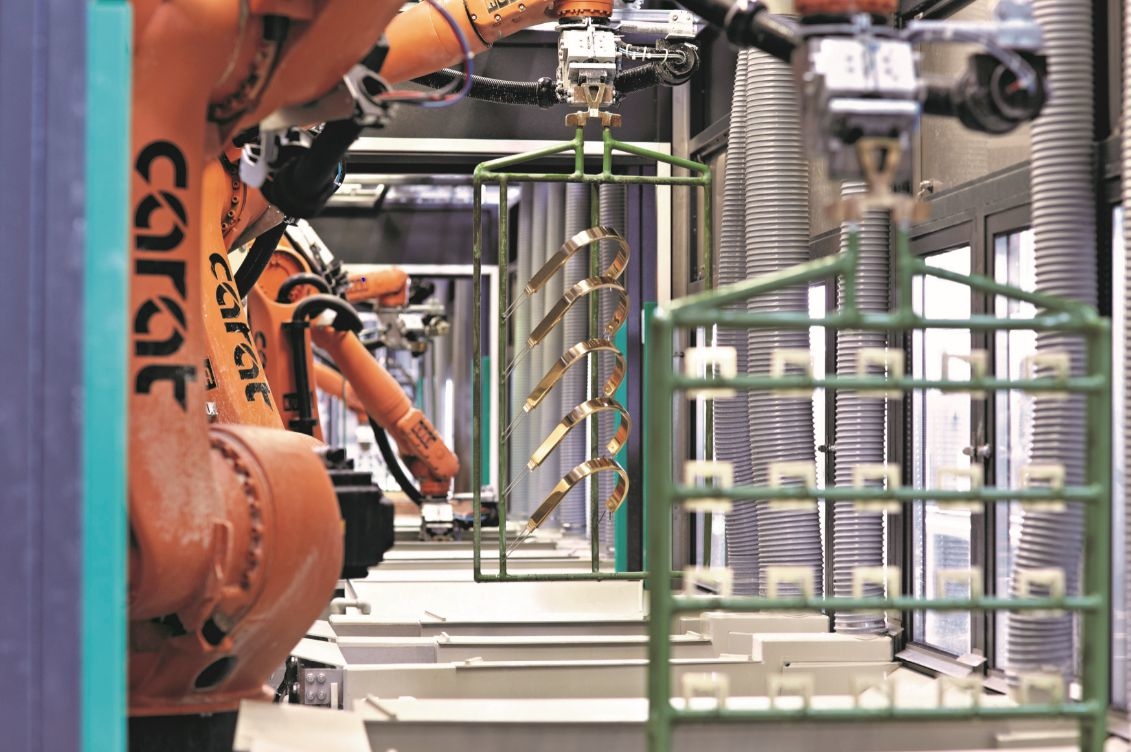In addition to raw materials such as clay, copper, wood, brass and steel, water and electricity are essential for the production of high-quality sanitary ceramics, valves and bathroom furniture. In order to be able to generate and use these resources in the most environmentally friendly way possible, German sanitation companies invest in holistic energy management systems. For example, Keramag has equipped the large tunnel kilns in many of its plants that are necessary for the production of ceramics with very modern burner technology, which reduces CO2 emissions by around 6,500 tonnes annually. Other companies, such as Keuco, operate their own combined heat and power plant at the main plant in Hemer, Germany: the plant, which was built in 2015, supplies hot water and electroplating with heat all year round. During the heating period, the plant supplies additional heat to the building heating and ventilation systems. "In total, the block-type thermal power station covers 93 percent of the required production process heat. As a result, we were able to shut down the existing boiler for the production processes and significantly reduce CO2 emissions," explains Katja Zimmermann from Keuco. Other companies, on the other hand, use the heat generated during production to heat other existing building components such as Kemper or Geberit. Kemper diverts the waste heat generated in the foundries to the heating system of the administration buildings. The waste heat from the machines is also used to heat the entire building in some of Geberit's particularly ecologically equipped plants: "We can therefore completely dispense with fossil fuels at some locations," says Volker Röttger.
Clever recycling of raw materials
The majority of Blue Responsibility member companies use as little packaging material as possible. By participating in a well-known recycling system, Mepa, for example, recycles all its transport packaging: paper, cardboard, mixed plastics and waste wood. "In this way we save around 64 tons of CO2 emissions per year," Veit Szpak is pleased to report. But that's not all: Dornbracht, for example, maintains complex air filter systems in many production facilities to filter out grinding dust and metal chips. "In this way, the raw materials present in the extracted air can be recycled," explains Inga Liesenjohann from Dornbracht. Even for adhesives that are necessary for the production of shower panels, but belong to the category of so-called hazardous substances, sustainably producing sanitary companies are always looking for alternatives. And this with success, as Verena Töpfer-König from Franke confirms: "We were able to reduce the use of hazardous substances by 28.3 percent in one year through the use of more modern, ecological adhesives".
Bathroom furniture without CO2 footprint
Burgbad stands out among bathroom furniture manufacturers: in 2016, it is the first manufacturer to receive the "Climate Neutral Furniture Manufacturer" label awarded by the German Furniture Quality Association (DGM). CO2 emissions are avoided in the manufacturing process, e.g. through the use of natural gas or biomass. The wood waste generated is recycled as an energy source for production facilities. More than 70 percent of the wood used at Burgbad also comes from sustainable forestry and the fillers for the washbasin production consist of natural sands from Germany. The company even offsets the unavoidable fuel consumption of its vehicle fleet by acquiring high-quality gold-standard certified CO2 emission rights. These support climate protection projects all over the world.
Intelligent location planning and logistics
Intelligent planning of transport routes between individual production plants and suppliers also helps to reduce energy consumption and contributes to sustainability. By selecting German or Central European suppliers, German sanitary manufacturers ensure that transport routes and thus CO2 emissions remain low. Geberit, for example, bundles its traffic and freight costs: transports between its own production plants are linked with those of customer deliveries. In line with the motto "Made in Germany", most of the German sanitary manufacturers manufacture at domestic locations. In addition, employees in logistics, for example, are regularly trained in environmental measures in accordance with the DIN EN ISO 14001 standard.
"In addition to the mandatory environmental audits, many of our initiative members are also voluntarily certified in terms of environmental management and sustainability," explains Wolfgang Burchard of Blue Responsibility. "This voluntary commitment and their commitment to numerous environmental initiatives make them role models for other industries as well.
Source of picture: Aloys F. Dornbracht GmbH & Co. KG
